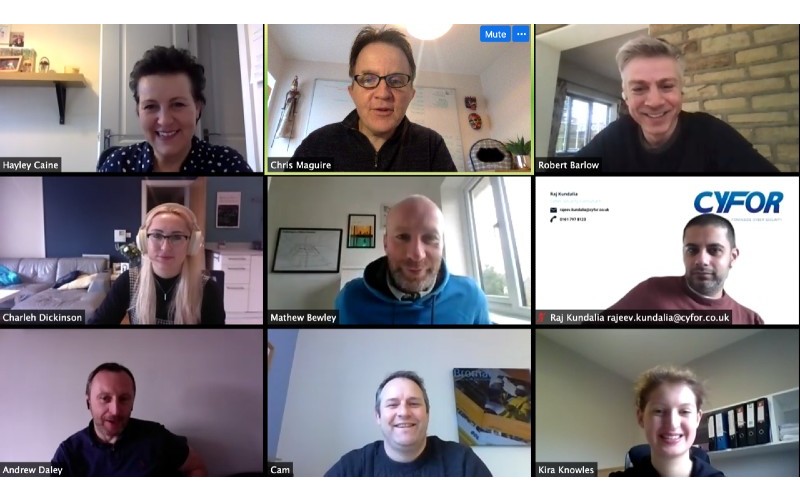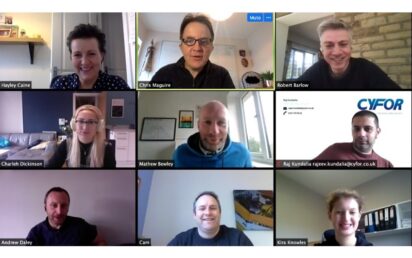Running a business can be a lonely place, especially during a global pandemic.
But imagine if you could join a virtual network of your business peers and tackle some of the common challenges we all face – and it won’t cost you a penny.
Where do I sign? That was the backdrop of me joining a national peer-to-peer networking programme for SME leaders called Peer Networks.
The sessions are delivered locally in Greater Manchester by GC Business Growth via their partner Winning Pitch.
Winning Pitch has just been acquired by London-based Newable and was founded by an old acquaintance of mine called John Leach.
John was the guest speaker of an event I attended in Chorley about 15 years ago when he held up a £20 note and asked the audience who wanted it the most. “If you want it then come and get it,” he said. John hadn’t even completed his sentence when I’d shot up out of my chair and pocketed the £20.
Peer Networks might not hand out free £20 notes, but it’s aimed at SME businesses that have operated for a minimum of one year; have at least five employees; boast a turnover of £100,000+; and have an aspiration to improve.
I was invited to join the latest cohort that has been meeting fortnightly from January to March on the basis that I would share my experiences.
https://businesscloud.co.uk/from-comics-to-mountain-rescues-what-smes-can-learn-from-jetpacks/
At the outset, a number of things are expected of anyone joining Peer Networks that can be summed up by five key traits: commitment; trust; an open mind; honesty; and a willingness to listen.
In return, the programme provides each participant with 18 hours of free facilitated group support and a minimum of 3.5 hours of additional one-to-one support focused on your problem or actions arising from your group discussions.
In our case our expert facilitator is a real character called Hayley Caine, but the strength of a peer-to-peer group will always be the calibre of the businesses around the virtual table and on this front I got lucky.
I won’t name everyone, but they included a likeable Kiwi called Cameron Berry, who is the managing director of recruitment company called Bromak. “What part of Australia are you from?” was my clumsy attempt at an introduction.
It was a real quality line-up with other members of the cohort including Mark Pollitt, founder and managing director of Digicomm 360 in Bolton; Matthew Bewley, director of 3B Training in Wigan; Robert Barlow, managing director of Relative Marketing in Bolton; Rajeev Kundalia, a cyber security consultant at CYFOR; Charleh Dickinson, digital marketing director at KUB; Andrew Daley, director, procurement technology and spend management at Edbury Daley; and Kira Knowles, accommodation manager at Portergate Property Management.
Peer Networks is based on a principle of ‘action learning’ which is when a small group of people work on real problems.
This is what I found most helpful. At every session two or three participants will share a particular business challenge and the other members will ask a series of questions that will hopefully help the individual plot a strategy forward.
Participants are constructively challenged and the group is encouraged to ask questions rather than offer solutions.
Members are encouraged to update everyone at the start of subsequent meetings on whether the advice helped them resolve the problem.
https://businesscloud.co.uk/astonishing-288m-funding-round-values-virtual-events-platform-at-4bn/
Although you don’t realise it at the time, one indirect consequence of attending Peer Networks is it encourages accountability.
When I was a kid, my mum used to go to Weight Watchers and she said it was the knowledge of getting weighed in front of the other members that encouraged her to try a bit harder.
Peer Networks operate a similar principle but without the weighing scales. You know you’re going to be asked to update fellow members, so you try a bit harder.
At the end of every session, the super–efficient Hayley sends out an overview with agreed action points, which are reviewed when you next meet.
The fortnightly sessions last three hours and members complete a survey at the end of every meeting,
There’s also a WhatsApp group for members to stay in touch between sessions which is a useful tool for getting to know everyone better.
My final Peer Networks session is due to take place in March but most of the members have already agreed to continue our meetings on a monthly basis to share our experiences.
So what have I learnt from Peer Networks? The first thing is that by speaking to other businesses you realise that the challenges we face are broadly similar.
The second thing is you can forge new relationships with people virtually. What started with a roomful of strangers became a roomful of friends despite the fact I’ve never them personally.
Advertise with BusinessCloud and reach the UK’s tech community
The third is around trust. Journalists don’t have a great reputation and the group is based on confidentiality. I’ve benefited by being a bit more open.
And the final thing is that if you invest a bit of time in a group like Peer Networks you get a lot more in return. I’ve been working for 30 years but I’ve run my own business for less than two. I’ve got so much to learn and Peer Networks helps fill in some of the gaps.
Would I recommend Peer Networks to other people? Definitely. It’s completely free so what have you got to lose?
- For more information about joining the next Peer Networks group contact Jon Dingoor of Winning Pitch, at j.dingoor@winning-pitch.co.uk or 07889 584 306


